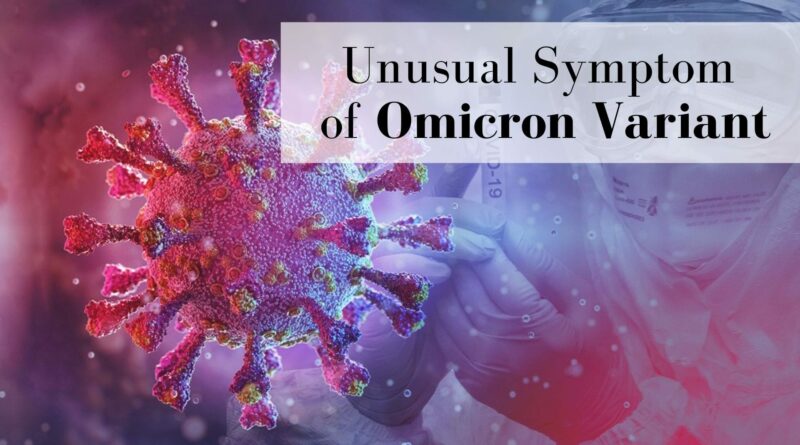Is Diarrhea a Symptom of Omicron
There are many possible causes of diarrhea, and it can be a symptom of several different conditions. Omicron is one such condition. Diarrhea is often one of the first symptoms of omicron, and it can be a very debilitating symptom.
Diarrhea can cause a great deal of discomfort and can make it difficult to carry on with normal activities. In some cases, diarrhea may be severe enough to require hospitalization. If you have diarrhea and are concerned that it may be a symptom of omicron, it is important to see your doctor for an evaluation.
Your Diarrhea Could Be COVID Symptom! Watch This!
There’s no denying that diarrhea can be a real pain – literally. But what many people don’t realize is that it can also be a symptom of a more serious underlying condition, such as omicron.
Omicron is a rare but potentially fatal disorder that affects the digestive system.
One of its most common symptoms is chronic diarrhea, which can lead to severe dehydration and other complications if left untreated.
If you or someone you know has been experiencing persistent diarrhea, it’s important to see a doctor right away to rule out omicron or any other potential causes. Early diagnosis and treatment is critical to preventing serious health problems down the road.
Omicron Diarrhea How Long Does It Last
Omicron diarrhea is a condition that results in frequent, watery bowel movements. It can be caused by a variety of things, including certain medications, infections, and underlying medical conditions. Omicron diarrhea typically lasts for a few days and resolves on its own.
However, some people may experience chronic omicron diarrhea that lasts for weeks or even months. If you have omicron diarrhea that lasts longer than a few days, it’s important to see your doctor so they can rule out any underlying causes.
Is Diarrhea a Symptom of Omicron Covid
If you have omicron covid, there is a chance that you may experience diarrhea as a symptom. This is because the virus can cause gastrointestinal issues, which can lead to diarrhea. However, it is important to note that not everyone who has omicron covid will experience this symptom.
If you do experience diarrhea, it is important to stay hydrated and see your doctor if the symptoms are severe.
Omicron Diarrhea Treatment
If you are one of the unlucky people who suffer from omicron diarrhea, there is hope. Although there is no cure, there are treatments that can help lessen the symptoms and make life more bearable.
Omicron diarrhea is caused by a build-up of toxins in the intestines.
These toxins come from bacteria and other organisms that live in the intestine. When these toxins reach a certain level, they cause inflammation and irritation of the intestine walls, leading to diarrhea.
The most effective treatment for omicron diarrhea is a course of antibiotics.
This will kill the bacteria and other organisms that are causing the problem. However, it may take several courses of antibiotics before the symptoms go away completely. In some cases, surgery may be necessary to remove part of the intestine that is affected by the disease.
Although there is no cure for omicron diarrhea, with proper treatment most people are able to lead normal lives.
Omicron Symptoms
Omicron is a Greek letter that is often used in mathematical and scientific notation. It can be difficult to identify symptoms of Omicron because the condition is rare and not well-known. However, some common signs and symptoms of Omicron include:
-Intellectual disability
-Developmental delays
-Speech impairments
-Motor skill impairments
-Seizures
If you or your child exhibits any of these signs or symptoms, it is important to consult with a medical professional.
Early diagnosis and intervention can improve quality of life for individuals with Omicron.
Symptoms of New Omicron (B.1.1.529) Variant of Coronavirus
The New Omicron (B.1.1.529) variant of coronavirus was recently discovered in the United Kingdom and is now being seen in the United States. This new variant is associated with a higher risk of severe disease and death, and is believed to be more contagious than other variants of coronavirus. Symptoms of this new variant include fever, cough, shortness of breath, and difficulty breathing.
If you have any of these symptoms, it is important to seek medical attention immediately as this new variant can lead to severe illness and even death.
Omicron Variant Symptoms in Adults
Omicron variant symptoms in adults are a group of neurological symptoms that have been associated with the omicron protein. The omicron protein is found in the brain and is involved in the development and maintenance of nerve cells. Mutations in the omicron gene have been linked to several neurological disorders, including autism, schizophrenia, and intellectual disability.
Symptoms of the omicron variant can vary depending on the individual, but may include cognitive impairment, social deficits, motor dysfunction, and seizures. These symptoms can range from mild to severe and often lead to a decline in quality of life for those affected. There is currently no cure for this condition, but early diagnosis and treatment can help improve outcomes.
Omicron Symptoms And Treatment
Omicron is a rare and serious condition that can cause a variety of symptoms. Early diagnosis and treatment is essential to managing the condition and preventing serious complications.
The most common symptom of Omicron is fatigue.
This can be accompanied by other symptoms such as muscle weakness, joint pain, headache, and fever. In more severe cases, Omicron can lead to organ failure and death.
There is no cure for Omicron, but early diagnosis and treatment can improve quality of life and prevent serious complications.
Treatment typically involves a combination of medication and lifestyle changes. Medications used to treat Omicron include immunosuppressants, antifungals, and antivirals.
Lifestyle changes that can help manage symptoms include getting plenty of rest, avoiding strenuous activity, eating a healthy diet, and managing stress levels.
If you or someone you know has been diagnosed with Omicron, it’s important to work with a team of healthcare professionals to create a treatment plan that meets your unique needs.
Nhs Omicron Symptoms
If you’re experiencing symptoms of the omicron virus, it’s important to seek medical attention right away. The omicron virus is a serious and potentially life-threatening illness that can cause severe respiratory illness. Symptoms of the omicron virus include fever, coughing, and difficulty breathing.
If you think you may have been exposed to the virus, or if you develop any of these symptoms, please see a doctor immediately. Early diagnosis and treatment is critical for patients with this condition. There is no specific cure for the omicron virus, but prompt treatment can help manage symptoms and improve chances for recovery.

Credit: www.nytimes.com
Is It Normal to Have Diarrhea When You Have Covid-19?
There is no one-size-fits-all answer to this question, as everyone experiences the symptoms of COVID-19 differently. However, diarrhea is a common symptom of the virus, and is experienced by many people who contract it. While it can be unpleasant and uncomfortable, it is not usually a cause for concern, and will typically resolve itself within a week or two.
If you are experiencing severe or persistent diarrhea, however, it is important to seek medical attention, as this could be a sign of a more serious complication.
What are Some Symptoms of the Covid-19 Omicron Subvariant?
The COVID-19 Omicron subvariant is a novel coronavirus that was first identified in Japan in early 2020. It is similar to other known coronaviruses, such as SARS-CoV and MERS-CoV, but has unique characteristics that make it more virulent and dangerous.
The most common symptoms of the COVID-19 Omicron subvariant include fever, coughing, and shortness of breath.
These symptoms are similar to those seen in other respiratory illnesses, such as influenza or pneumonia. However, the COVID-19 Omicron subvariant appears to be more severe, with patients often requiring hospitalization and intensive care.
In addition to the common symptoms listed above, the COVID-19 Omicron subvariant can also cause severe respiratory distress syndrome (RDS), which can lead to death.
RDS is characterized by high levels of inflammation in the lungs, which can cause fluid build-up and difficulty breathing. The mortality rate for patients with RDS is estimated to be between 20% and 40%.
As there is no specific treatment or vaccine available for the COVID-19 Omicron subvariant at this time, prevention is key.
Individuals should take precautions against exposure by washing their hands frequently, avoiding close contact with sick people, and disinfecting surfaces that may be contaminated with the virus. Early detection and treatment of symptoms is also critical for preventing serious health complications from developing.
Are Diarrhea And Nausea Symptoms of Covid-19?
There is a lot of misinformation circulating about the coronavirus (COVID-19) and its symptoms. So, it’s important to get your information from reliable sources.
According to the Centers for Disease Control and Prevention (CDC), diarrhea and nausea are not listed as symptoms of COVID-19.
The CDC does list loss of taste or smell, fever, chills, cough, shortness of breath or difficulty breathing, fatigue, muscle or body aches, headache, sore throat and congestion or runny nose as potential symptoms of COVID-19.
It’s also worth noting that these symptoms can vary in severity from person to person. Some people who contract the virus may have no symptoms at all while others may experience severe illness.
If you’re experiencing any sort of gastrointestinal distress, it’s more likely due to something else entirely unrelated to COVID-19. However, if you’re experiencing other symptoms on the CDC’s list along with GI distress, it’s possible that you could have COVID-19. In either case, it’s always best to consult with a medical professional to get an accurate diagnosis.
What are the Digestive Symptoms of Covid-19?
There are a number of digestive symptoms that have been associated with COVID-19. These include nausea, vomiting, diarrhoea and abdominal pain. In some cases, these symptoms may be the first signs of the disease and can precede other more common symptoms such as fever and respiratory problems.
Nausea and vomiting are relatively common symptoms in COVID-19 patients and can occur either on their own or together. Diarrhoea is also a common symptom, particularly in children. Abdominal pain is less common but has also been reported by some patients.
It is not yet clear why some patients experience digestive symptoms while others do not. However, it is thought that the virus may cause damage to the gastrointestinal tract which leads to these symptoms. In severe cases, patients may develop a condition called gastroenteritis which can lead to dehydration due to excessive fluid loss.
If you experience any of these digestive symptoms, it is important to seek medical attention as soon as possible so that you can be properly diagnosed and treated.




